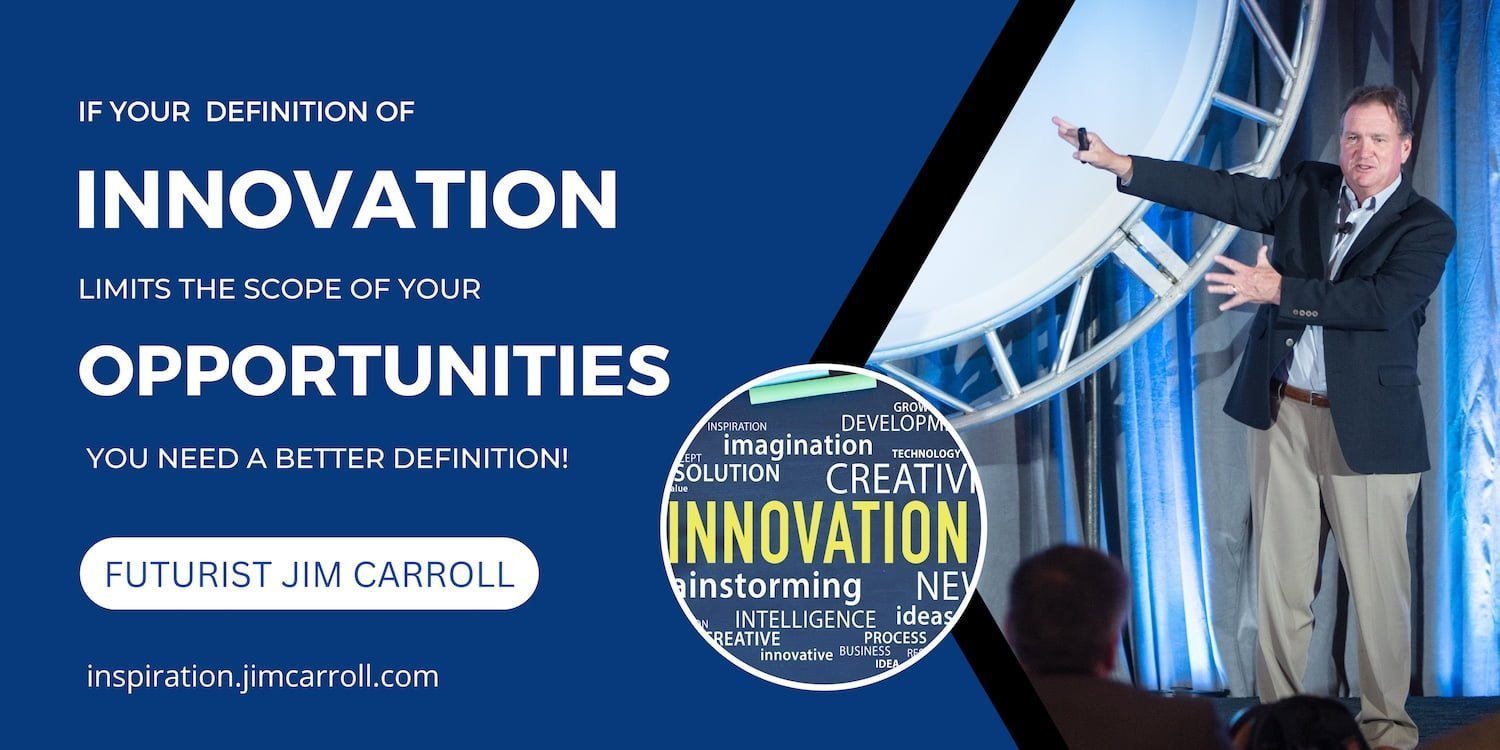“If your definition of innovation limits the scope of your opportunities you need a better definition!” – Futurist Jim Carroll

I was on an exploratory call with a client the other day – they are looking for, as the individual put it – someone to fire up the organization’s overall capability and willingness to be more innovative.
That got me going because, for a long time, I’ve always thought that organizations limit their perspective on what innovation can be – it goes far beyond the design and creation of new products and services. After the call, I shared with them an article that Credit Suisse distributed to its global client base in 2008; it featured an interview with me on the future and innovation. It does a great job of summarizing my thinking in regards to the call I just had.
 Credit Suisse, headquartered in Zurich, is a global financial powerhouse operating in 50 countries; with 48,000+ employees, and at the time of the article, assets of $75 billion US, and net assets under management of $1.345 trillion. Incidentally, it went out just before the global economic meltdown of that year, in which some of their actions and structure were featured prominently, actions that have been somewhat ongoing.
Credit Suisse, headquartered in Zurich, is a global financial powerhouse operating in 50 countries; with 48,000+ employees, and at the time of the article, assets of $75 billion US, and net assets under management of $1.345 trillion. Incidentally, it went out just before the global economic meltdown of that year, in which some of their actions and structure were featured prominently, actions that have been somewhat ongoing.
The article, titled Success Comes to Those Who Evolve, covered my wide-ranging views on the word “growth.” It came out well: my key message has always been that we must always link the concept of innovation to rapidly emerging trends in order to constantly change what we do — often simply to keep up, or attain competitive advantage.
Here’s the key point: So what’s the recipe to kickstart innovative thinking? “I think it’s about having your entire organization understand everybody is responsible for constantly figuring out how they need to change to keep up with the rapidly changing world. They need leadership that supports and encourages them to be open and share ideas, and that leadership needs to hammer home that message on a regular basis.”
You can read the full article here.
Here’s the bit where I focus on innovation.
Innovation is a word that is tossed around a lot. What’s your definition?
Most people think of Apple iPod when they are asked to give an explanation of innovation. People think innovation is limited to new product development. It’s much more than that. It’s having an organization where everybody, from the CEO on down, is always asking: “What can we do to run the business better? What can we do to grow the business? What can we do to transform the business?” The only way to stay ahead of the game is through constant innovation with those three fundamental questions.
If a company gets into that line of thinking there are huge opportunities for innovation. It can start with its business model, to its business processes to staffing methodology, and to customer service. We can also innovate with the type of insight we use to understand how quickly our markets are changing.
This is important, as it helps everybody to realize that innovation does not just come from techies.
Is that the key message you give to the heads of the companies that you are consulting?
They turn on the TV, see people talking about innovation, and again it’s the products that make the headlines. Of course, Steve Jobs is creating cool and wonderful things, but that isn’t necessarily what innovation is. Do the companies that bring you in expect a quick innovation fix?
A lot of companies expect miracles, and I explain to them that I can help their staff understand what innovation is, why it’s necessary given this high-velocity economy concept, and I can also make it very relevant in terms of the very rapid change occurring in the world of retail and beyond. So, will companies that hire me to walk away with an instant solution and a massive culture change? No. But will they be on the path of understanding to a greater degree what innovation is and what they do? Most certainly.
Can innovation really be taught or learned? Isn’t it just something that a person either has or doesn’t have?
I don’t think that’s true. If you have a CEO who instills that message and says: “Look, everything around us is changing rapidly and we have to watch these developments, understand them, and constantly ask if we are doing the right thing or if we should be doing something differently to deal with the rapid change surrounding us,” then you will have a very innovative organization.
And innovation is the key factor for growth?
It’s absolutely critical. If a company continues to do just what it has been doing for the past 10 years, it will come to realize that it’s stagnating. If you don’t move at the same rate the world does, by changing, innovating, and growing, you will be left behind.
Are there a lot of opportunities for innovation that are hidden in plain sight?
I think so because many people think it’s just something for special people, who do special things. I go into organizations that have created an innovation team and have found that the team has silent meetings. That is just silly. Building these teams creates rumors and uncertainty in the staff who, of course, are wondering just what it’s exactly these people are doing. Other companies think that putting out a suggestion box is enough to kick-start innovation.
That is ludicrous. Innovation isn’t magic. The world is changing rapidly and we have to change to keep up with it.
So what’s the recipe to kick-start innovative thinking?
I think it’s about having your entire organization understand everybody is responsible for constantly figuring out how they need to change to keep up with the rapidly changing world. They need leadership that supports and encourages them to be open and share ideas, and that leadership needs to hammer home that message on a regular basis. It’s easier for small companies to do this because they are not weighted down by the bureaucracy that actually clogs up a lot of the big innovations. No matter what industry you work in, big or small, big changes are a given, so my message is: “Keep up, continually change what you do and how you do it to be successful.”
What final words of advice would you give to individuals and companies?
You build and grow by trying new things, whether you succeed or fail. We all learn from our failures. The bigger risk isn’t evolving with the pace of the world.




GET IN TOUCH
Jim's Facebook page
You'll find Jim's latest videos on Youtube
Mastodon. What's on Jim's mind? Check his feed!
LinkedIn - reach out to Jim for a professional connection!
Flickr! Get inspired! A massive archive of all of Jim's daily inspirational quotes!
Instagram - the home for Jim's motivational mind!